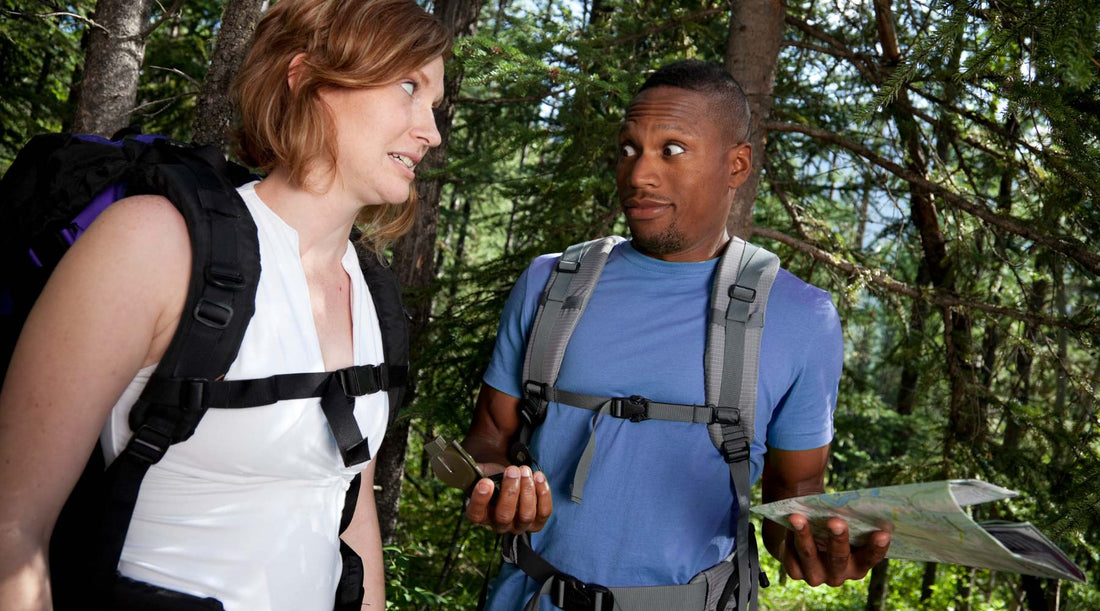
Plan Ahead, Prepare, and Be Aware: Our Top Tips for Staying Found While Hiking
It’s been a great day so far. You woke up before sunrise, packed your bag, and drank coffee on the quiet drive to the trailhead.
The first several miles were what every hiker dreams of. You had the trail to yourself and the scenery was even better than the photos you Googled last night.
But as your stomach starts to rumble for lunch, you realize it’s already noon. You thought you’d be at your destination — a remote waterfall — by late morning.
After taking a closer look at your surroundings, you’re not even sure you’re on the trail anymore. You haven’t seen a blaze in what feels like miles, and you still haven’t seen another soul.
Now you’re getting nervous. In your excitement for this hike, you didn’t prepare as much as you should have. As much as you hate to admit it… you’re lost.
This scenario is all too common — you’ve likely heard countless stories about people getting lost while hiking. It’s a terrifying experience we all want to avoid.
So we’ve compiled a list of our best tips — from trip prep to when you’re out on the trail — to ensure you stay found and know what to do when the unexpected happens.
How to Avoid Getting Lost While Hiking

The easiest way to avoid having to find your way out of the wilderness is to avoid getting lost in the first place. Obviously, getting lost is nobody’s goal. But taking some precautionary steps can make a big difference in whether or not it happens.
Pack the 10 essentials
Outdoor enthusiasts should always carry the 10 essentials, especially when going on an extended hike or an overnight trip. Bringing the right gear can make the difference between getting lost and staying found.
Here’s a quick rundown of the 10 essentials:
- Navigation (Map, compass, and GPS)*
- Light source
- Sun protection
- First aid
- Repair kit
- Fire starter
- Shelter
- (Extra) food
- Water and a method of purification
- Extra layers
To learn more about each of these items, check out this blog post: The Hiker’s Guide to the Ten Essentials.
*Don’t rely on a GPS — always bring a map and compass, which don’t require a battery or signal.
Plan your hike beforehand
This might sound obvious, but planning your hike can make a big difference in whether or not you get lost on the trail.
Take the time to research a trail before you set off on your hike. Check out recent trail conditions, reviews from other hikers, and — of course — a map. There might be a section that’s tough to navigate, and reading about it beforehand can put you on alert.
Tell someone where you’re going
Make it a regular practice to let a trusted, responsible friend know where you’re hiking and when you’ll be back.
Let them know when — if they don’t hear from you — they should call for help. And don’t forget to let them know when you return safely!
It’s best to have someone monitoring your safe return. But in a pinch — or for extra precaution — leave a note with your hiking plan on your dashboard at the trailhead. Similarly, if there’s a trail register at the trailhead, sign it.
Consult your map regularly
Don’t wait until you’re lost to take out your map. Ideally, you should study your map before you even set off on the trail. But you should also check your map once in a while along your route. Keeping track of your progress along the trail will make it easier each time you want to pinpoint your location.
Stay on the trail
One of the best ways to avoid getting lost while hiking is to stay on the trail. Granted, this isn’t always as easy as it sounds. Sometimes trails can become unclear, especially when they cross rocky outcroppings or water.
But it can also be tempting to head off the trail — and we encourage you, under most circumstances — not to. Woods, mountains, and meadows can look exceptionally similar, and stepping off the trail can cause you to quickly lose your bearings. Stick to your plans as best as possible. Remember, if you told someone you’d be hiking a specific trail, that’s where they’re going to look for you if you get lost.
What to Do If You Get Lost While Hiking

Sometimes — despite how well you prepare — the unexpected happens. That’s why in addition to knowing how to avoid getting lost while hiking, you should know what to do if it happens.
Calm down
Easier said than done, sure, but this one’s important. Who makes good decisions when they’re panicking?
If you realize you’re lost while hiking, the first thing you should do — as unnatural as it may feel — is to stop walking and take deep breaths. You shouldn’t try to find your way out if you’re in a panic. You need a level head before making any plan of action. Do your best to calm down before taking any (literal or figurative) steps.
Mentally retrace your steps
Without actually walking anywhere, think about where you’ve been hiking. Are there any notable landmarks you remember crossing? If you found yourself off-trail, when’s the last time you were sure you were on the trail? When’s the last time you checked your map? Visualize a mental map of your hike up to this point with as much detail as possible.
Use a map and compass to get oriented
With your mental map in mind, take out your topo map and compass and try to get oriented. Match big landforms (rivers, canyons, waterfalls, etc.) that you currently see or remember seeing with the landforms on the map.
Keep in mind how long you’ve been hiking, which direction you’ve been hiking, and how many miles you think you’ve covered. All this information can help you narrow down your location on the map.
Consider staying put
If you’re lost without a plan for getting yourself out, the best move might be to stay put. You should consider staying put when:
- You can’t figure out where you are
- You can’t find a route to get back
- You have an injury that will make hiking out difficult or impossible
- You don’t have enough daylight to get out before dark.
If you make the decision to stay where you are, know that this will make a rescue easier. Focus on making yourself comfortable for the night with your shelter and extra clothes, and don’t forget to eat and stay hydrated.
Consider hiking out
If you can confidently locate yourself on your map and find a route back to the trail or the trailhead, hiking out may be your best option.
If you decide to hike out, make sure you’re up to the task. Eat, hydrate, and rest if needed before making the trek. Mark your route as best you can — with rocks, sticks, heavy footprints, etc. — so that you can find your way back if you end up more lost. But again, you should only try to rescue yourself if you’re confident about your location and navigation skills.
Call for help
No one wants to call for help, but sometimes it’s the best idea. If you planned well, your contact person should notify search and rescue when you don’t return on time. But if you have the ability to call for help on your own, that can make the rescue even easier.
If you have a phone signal, call 911. If you have other technology, like a SPOT device, for example, use it to call for help. You can’t always rely on technology — signal, battery life, and function are never certain — so you might need to use other tools to get someone’s attention.
A whistle can alert nearby hikers of your location. Depending on where you’re hiking, building a smoky fire might be another option. Without getting more lost, you can move a short distance to a more visible location — like an open meadow.
Plan Ahead to Avoid Getting Lost
No one wants to get lost on the trail — so make sure you do as much as you can to avoid getting lost in the first place. If the worst does happen, try to stay calm so you can make the best plan of action.
Do you have a tip for staying found on the trail? Let us know in the comments below!




